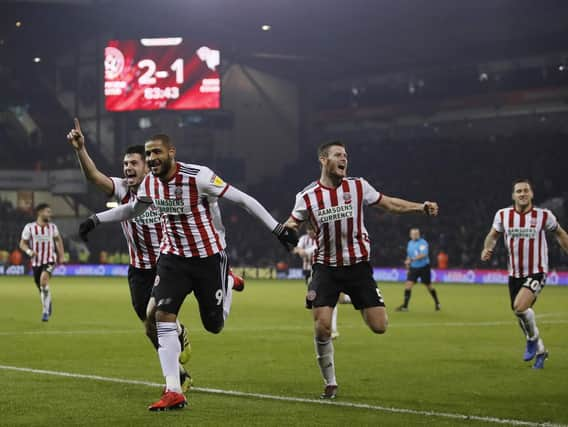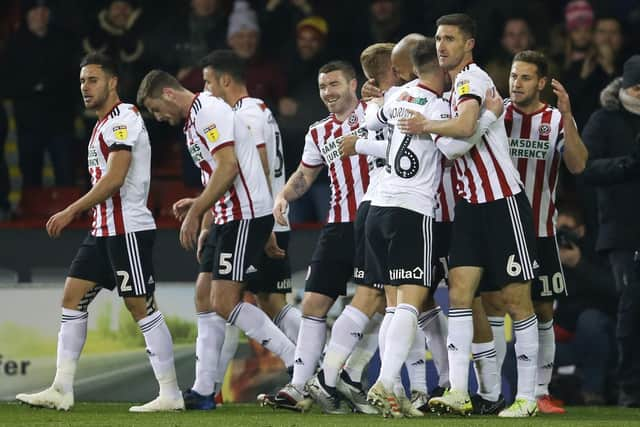Pro's and con's of focusing on pace


But there is a school of thought inside Bramall Lane, promoted by some of those close to the recruitment process, thatÂ
Chris Wilder must not allow the clamour for pace to influence his work too heavily during next month's transfer window.


Advertisement
Hide AdAdvertisement
Hide AdIt stems from the way United have played since appointing the 51-year-old, with defenders encouraged to join in attacks and overwhelm opposition defences. Because the action becomes so squeezed, because space is at a premium, many of those tasked with identifying their targets believe speed is not necessarily a pre-requisite.
Danny Higginbotham, the former United full-back turned tactical analyst, understands the reasoning behind this theory. But, as Wilder presses ahead with his efforts to change how people perceive the game, he still thinks fleet-footed strikers can flourish within the manager's pioneering template.
"All of the top teams have pace," Higginbotham says. "And yet most of them, pretty much every single week, will come up against sides who are ready to sit deep and try to smother the action. So what that tells you, the fact all of the leading clubs still like to have quick people at their disposal, is that it can be a dangerous and very effective weapon."
Wilder has made no attempt to disguise the fact he believes United, who will enter tomorrow's game against Blackburn Rovers ranked fourth, require more firepower in order to remain competitive at the top end of the Championship. Having rued a series of missed opportunities following the recent defeat by West Bromwich Albion - "We need to make more of the big moments" - he reprised the theme again before Boxing Day's win over Derby County.


Advertisement
Hide AdAdvertisement
Hide AdThe trouble is, as Wilder's efforts to shoe-horn Conor Washington into his starting eleven demonstrate, pace and United's usual modus operandi are not always comfortable bedfellows.
With Billy Sharp and David McGoldrick emerging as United's most prolific partnership ahead of Rovers' visit, when they will face a squad searching for only its fourth away win of the campaign, those who argue qualities such as experience and movement are more desirable appear to have an argument.Â
Despite being sympathetic, Higginbotham explains why Washington, the fastest member of Wilder's frontline, remains a valuable asset; particularly against clubs unlikely to adopt an expansive game plan.
"When you're one of the best teams in a division, as United have clearly shown they are, you'll have a lot of matches where opponents sit in and make the game narrow. So the question is then, how do you stretch the play? Well, one of the most obvious ways is with pace.


Advertisement
Hide AdAdvertisement
Hide Ad"A centre-forward like that might not touch the ball much if the other team is set-up like that. He might only touch it once or twice during a half. But just by being there, if he works and runs, then he'll stretch the defence with his presence. Because people will still have to go with him."
After watching Sharp, McGoldrick and Leon Clarke all find the back of the net against County, Wilder acknowledged he faces a difficult but desirable selection dilemma ahead of the meeting with Tony Mowbray's side. Clarke, United's leading marksman last term, was on target after being summoned from the bench during the closing stages and, like his fellow goalscorers, is not blessed with searing pace.
"Intelligence is key, absolutely vital in fact," Higginbotham continues. "If you look at all those players, and someone like Mark Duffy in those attacking areas as well, they all possess that. If you can read the game well, appreciate what going into a certain area is going to make a defender do, that can be just as dangerous.'
Although it seems churlish to criticise United's performances of late - they are, after all, rubbing shoulders with teams who think nothing of spending over £6m on a striker - there is still a feeling Wilder's players could make more of theÂ
Advertisement
Hide AdAdvertisement
Hide Adopenings they create. Statistics reveal that Leeds, Norwich City and West Brom, the three teams above them in the table, spend longer in their own final thirds of the pitch than United. But all three have scored more goals. That has led to suspicions that recruiting adequate competition and cover for Duffy, who movement can cause opponents all manner of problems, is also important. "People like Mark can make a tangible difference to the team as a whole," Higginbotham says. "So that could be another way to go. They're the in-between men, if you like, who can stop strikers becoming isolated and meanÂ
defenders and other midfielders don't always have to go long."